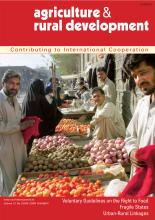Land Library
Bem-vindo à Biblioteca do Land Portal. Explore nossa vasta coleção de recursos de acesso aberto (mais de 74.000), incluindo relatórios, artigos de revistas científicas, trabalhos de pesquisa, publicações revisadas por pares, documentos jurídicos, vídeos e muito mais.
/ library resources
Showing items 343 through 351 of 354.Life without liberty would result in some or the other form of slavery.
Fragile states, posing a major challenge of our times, are increasingly becoming a focus of attention in international politics and development cooperation. But very often, the viewpoint of the people affected by fragile statehood is not sufficiently heard.
Until 1978, the Afghan state was weak but stable. In contrast, rural regulatory structures that complemented the state have always been strong.
Somalia is the longest known case in modern times of a country whose central state has ceased to exist for many years. Although Somalia is often said to be a country in chaos and anarchy, a new form of social organization emerged here some time ago.
After ten years of civil war in which grave human rights violations and atrocities were committed, especially against women and children, Sierra Leone was regarded as a «failed state». A massive UN peacekeeping mission managed to demobilize the combatants in 2002 and peace was restored.
Afghanistan, Sierra Leone and Somalia: these three countries stand for different histories of a fragile state.The author of this article analyses different case studies to determine the various causes, such as the role of ethnic identities, claims to power by clans and other sub-state groups, or
Development policy has to deal with the full spectrum of fragility in developing countries, which can range from individual deficits, for example in guaranteeing security, to the total collapse of state structures.The scope available to development policy and other external actors is always limit
Urbanisation and economic transformation - the growth of non-farm, industrial and service sectors - offer many opportunities for improvements in poor people's lives.The crucial challenge is to ensure that places work better for people, providing an enabling and supporting environment for changing
Although «urban» and «rural» development are often considered as in opposition to each other and seen as competing with each other for investment and support, many urban centres owe much of their economic base to agriculture.

